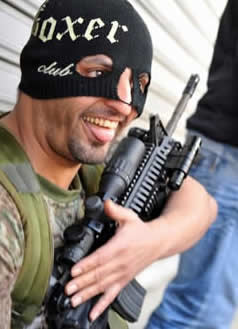 While some US congressmen are pushing to cut $100 million in military assistance budgeted for Lebanon over fears of Israel's security and Hizbullah's leading role here, slashing the aid would only make Hizbullah stronger, drive the army toward US rivals and erode US credibility here, a number of analysts told The Daily Star on Wednesday.
While some US congressmen are pushing to cut $100 million in military assistance budgeted for Lebanon over fears of Israel's security and Hizbullah's leading role here, slashing the aid would only make Hizbullah stronger, drive the army toward US rivals and erode US credibility here, a number of analysts told The Daily Star on Wednesday.Another example of coming to a conclusion and then building your arguments to support it.
The issue erupted in Congress after an August 3 incident in Adaysseh near the Lebanese-Israeli border, where Israel's cutting down of a tree sparked a firefight which killed two Lebanese Armed Forces (LAF) soldiers, a Lebanese journalist, and an Israeli officer. Some US lawmakers voiced objections to the aid on the grounds that US weapons could wind up being used by the LAF against Israel, the closest US ally in the region.
In the years before the Adaysseh clash, US officials had backed aid to the LAF as benefiting Israel, subscribing to a philosophy that building up the LAF would weaken Israeli foe Hizbullah, while a stronger LAF could help keep the Israel-Lebanon border calm, said retired General Elias Hanna, who teaches political science at various universities. After the summer 2006 war between Israel and Hizbullah, the UN Interim Force in Lebanon was beefed up to about 13,000 peacekeepers, while the LAF deployed in south Lebanon for the first time in decades.
Although the US has poured some $700 million into the LAF since the Syrian military departed Lebanon in 2005, the LAF's paltry arsenal still does not in the least represent a threat to the powerful Israeli military, Hanna added.
Considering that reality, the displeasure expressed by the congressional representatives could have also contained a political message to Israel, as an attempt to reassure it of unflagging US support for Israeli security while the administration was cajoling Israel to return to direct peace talks with the Palestinians, Hanna added.
At the same time, the legislators were venting their discontent over Hizbullah's increased sway over affairs in Lebanon and its presence in the government, said Paul Salem, head of the Carnegie Middle East Center. Some congressmen said they worried that arms given to the LAF could end up under Hizbullah control or in the group's possession.
"For them, that's a very simple argument that you should punish Hizbullah by punishing the army," Salem said. "It's not a complex argument."
Salem added that he anticipated that Congress would prevail in paring down US funding for the LAF, despite US President Barack Obama's administration continuing to call for the full $100 million aid package as part of a regional strategy. The mix of US midterm elections, US fiscal distress, public opinion and staunch pro-Israeli feeling should add up to a loss in US assistance to the Lebanese military, he said.
"The US administration is clear that it wants to maintain the aid; the problem is in Congress," Salem said. "This is going to have an impact and a negative impact.
"I expect there will be cutting -- the question is how much."
Reducing aid to the LAF, however, would backfire against US interests, said former Ambassador Abdullah Bou Habib, a political consultant and executive director of the Issam Fares Institute, a non-partisan think tank. A weaker LAF would lead the population to feel a greater reliance on the weapons of Hizbullah; the historical justification for the existence of Hizbullah rests on the inability of the Lebanese military to protect south Lebanon from the frequent intrusions of Israel, Bou Habib added.
Shrinking US assistance to the LAF "would make the arms of Hizbullah stronger," he said. Aside from concerns about Hizbullah and Israel, fortifying the LAF increases Lebanese sovereignty and allows the military to fight terrorists, he added. "It is in the interest of Lebanon and in the interests of the US that the US supply the Lebanese Army with the necessary weapons," Bou Habib said. "The majority of Lebanese would like -- and I think Sayyed Hassan Nasrallah agreed with it yesterday -- American weapons."
Not only would cutting support undermine the LAF's status, but it could also force the military to turn to US foes Iran and Syria for assistance, Salem said. President Michel Sleiman and Defense Minister Elias Murr, in response to Congress' objections to aiding the LAF, said they would propose to the Cabinet to seek military supplies from other sources.
Nasrallah, in his speech on Tuesday, said Lebanon should get military equipment from Arab states and Iran, which is Hizbullah's main patron. Iranian Defense Minister Ahmad Vahidi said on Wednesday that the Islamic Republic could deliver military aid to Lebanon.
With so much invested in Hizbullah, though, any aid from Tehran would amount to more of a political gesture, demonstrating how widely Tehran can project its power, Hanna said.
"Iran is willing to help the Lebanese army to a certain degree -- the Iranians don't want a competitor for Hizbullah," he added.
